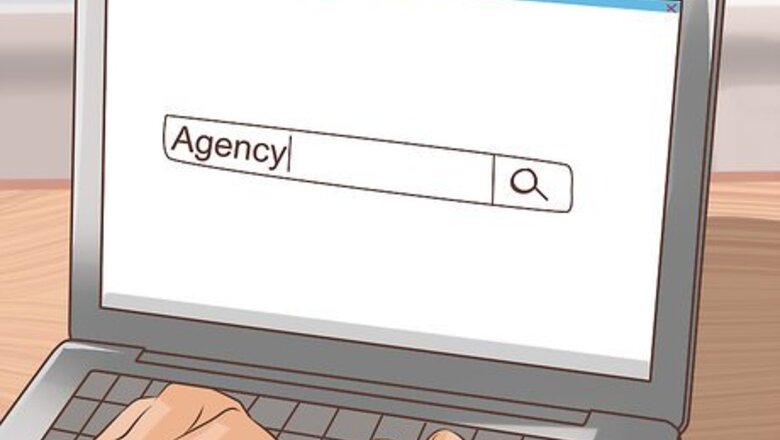
views
Getting the Attention of Local and State Officials
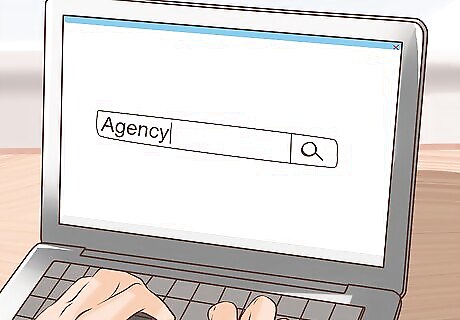
Find the right agency. Ironically, while state and local government has the most influence on our day-to-day lives, most people know much less about it than they do the Federal government. This can make it frustrate a citizen trying to make their initial contact with elected officials, not knowing if they need to talk with a city, county, or state official. Therefore, it’s best to do some preliminary research before you start venting your problems or paying visits. Say your issue is a car-killing pothole on the main road just outside your neighborhood. You need to speak with a city, county, or state official with the power to fix the road. Start at the lowest level and work your way on up, first talking to city officials, then county officials, and finally a state official. For a city or county, the department in charge of roads will probably be the Department of Public Works; for a state, the Department of Transportation. Just call them up and ask if that level of government maintains that stretch of road. If they don’t , they can probably tell you who does.

Talk to the right person. Talking to the right people doesn’t just mean talking to officials in a specific department. It also means talking to the right kind of official. An executive official, like one at the Department of Public Works or Transportation will have some latitude to decide what gets paved and repaired, but maybe not as much as you might think (and sometimes they’re unelected). If you make no progress with them, speak to your city or county council member or your state representative or senator. You’ll be able to find information on city and county officials on city and county government websites, and state government websites and ballotpedia.org are great sources of information on state officials.

Focus on facts. Whatever issue has led you to engage with your local officials may very well make you angry, frustrated, and disgusted—and that’s okay. You’re entitled to feel whatever way you want to feel, but it’s important to recognize that feelings alone probably won’t persuade anyone to do what you want them to do. The best way to persuade someone to act is to make them feel as you do, and to do that, you need to have facts on your side. Returning to the example of the pothole, it would be important to measure the size of the pothole in terms of circumference, diameter, and depth. Compare the depth of the pothole to the size of a wheel on a car. Explain how its position on the road makes it difficult to dodge. If you end up having to make a personal visit to your elected official, you will want to bring pictures showing all of the above.

Try and speak with them one on one. The council member or state legislator representing your district will spend at least some time in their office, and working for constituents like yourself is theoretically what they’re supposed to be doing. Call their office, find out when their office hours are, and try and set up an appointment with them. If and when you do meet with them, don’t forget the ground rules: Bring factual documents or any visual aids, such as photographs along with you. Clearly, calmly, and respectfully state your problem, how long it’s been a problem, what you’ve already done about it, and how you want it resolved. For example, "The pothole around the corner from my house has been a problem for the last three months. While it's always been an annoyance, it's getting to be downright dangerous. If we let it go on another month, it'll be a sinkhole. I've already made some calls to the Department of Public Works, but they say it's not in the budget. Can you speak with them?"

Come to a public forum. Public servants work for the public, and if you can’t get their anywhere with them in a private meeting, you might need to get your issue out into the open. Voicing your concerns at city and county council meetings and other public events (such as town halls, forums, and ribbon cutting ceremonies) might be the best way to get your issue the attention it deserves. If you’re trying to deal with a state issue, it’s probably for the best if you steer clear of actual legislative sessions. The public is not usually free to comment on pending legislation or other assorted problems within the legislature itself. Pressure state officials at other public events.

Bring your friends and neighbors. Strength in numbers is not simply an idle saying. In a democratic government, it is the foundation upon which power rests. If you as an individual can’t make any headway, talk to your friends and neighbors about the problem issue. They’ll probably think it’s a problem too, and when they hear how your pleas have fallen on deaf ears, they might get mad enough about it to support your efforts. At these levels of government, there are probably three ways in particular to make your voices heard. The classic method is to come in force to a public council meeting. That’s still very effective. The sight of a few dozen energized voters can change minds very quickly. Another method is the petition. You collect your signatures and present them in a public setting for maximum effect. Paper petitions are much more effective. A thousand signatures on paper looks more substantial than a thousand names on a webpage. Finally, you can hit your representative or council member with a social media bomb. A few dozen posts on the county’s Facebook page highlighting their inaction (or bad action) can have some intense ripple effects in terms of bad press.
Reaching out to US Representatives and Senators
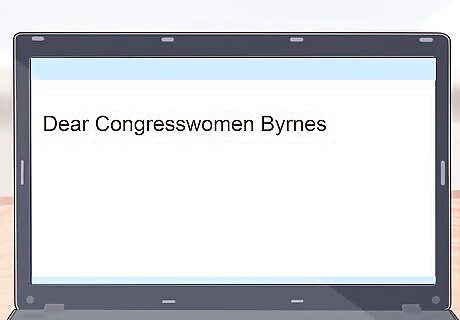
Write a letter. Writing a letter to a congressperson is one of the most time honored ways for constituents to interact with their representatives. Unfortunately, it is also one of the least effective in terms of individual impact. Much like voting itself, the impact of letter writing is in the aggregate. Since polls are expensive, elected officials often use letters as a gauge of public support or antipathy for a particular issue. The format of writing a letter to your congressperson isn’t much different from any other letter. You’ll put the address in the top left corner and begin with the formal salutation “Dear Congresswoman Byrnes…” From there, simply tackle the issue in a logical manner. Begin with an introduction of yourself, move on to a statement of the problem and who it affects, and your preferred resolution. Try and keep it limited to one issue per letter, and of course, be polite. You’ll probably get a response of some kind from your representative. These are often form letters, but not always. If your concern is unusual, important, or just well thought out, you may very well get a personal letter. Representatives like to show their constituents that they’re paying attention to them (called “constituent service”), and making sure constituents get an acknowledgement of their concern is an important way to do that. Should you get a response, follow it up with a brief thank you letter. It’s an unusual enough step that it would make you stand out.
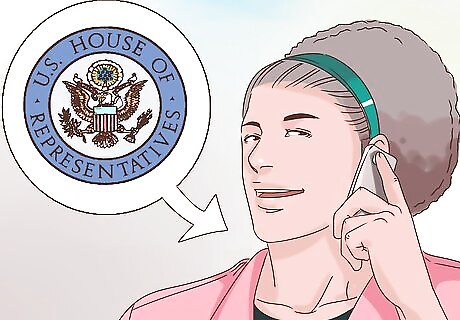
Call their office in Washington. Similarly to letter writing, a single phone call is unlikely to have an enormous impact on policy. Phone-calls are more likely to inform your representative or senator of what the local opinion on a particular issue is. It can make a difference, but only in the aggregate. You’re very unlikely to speak with your actual representative when you call; it would be surprising if you did. You’ll more likely than not speak with a member of their staff instead, who will pass along the messages—in the aggregate—to your congressperson.

Get to know the staff in their local offices. If you’re not a big donor or a well-connected member of an important interest group, it might be hard to get face time with your local representative. One way to overcome those types of barriers is by creating relationships with staff at local congressional offices. Each district has at least one (and oftentimes more), so it shouldn’t be too difficult to find one. You could find an address on your congressperson’s personal or governmental website. This is particularly effective if you employ it as a tactic in conjunction with calling and writing. If you object to the planned closure of a local post office, doing all three isn’t a bad way to get some attention on the issue. As always, there’s strength in numbers, and if you can get some of your neighbors and other affected parties to write and call along with you, all the better.

Join a group. The fact is, the Federal government is a large entity dealing with complex and important problems. Each congressional district contains over 700,000 people, and your concerns might be a drop in the bucket. Sometimes the best way to get your elected leaders to listen to you is by joining with a group sharing your concerns. This applies both to you as an individual and your group as an entity. Larger organizations have more sway, and members (especially important members) of organizations might find it easier to get the attention of legislators on even unrelated matters. “Group” can mean almost anything in this context. All kinds of groups engage in political action in some form, including labor unions, chamber of commerce, trade associations, and issue organizations like the Sierra Club or NARAL.
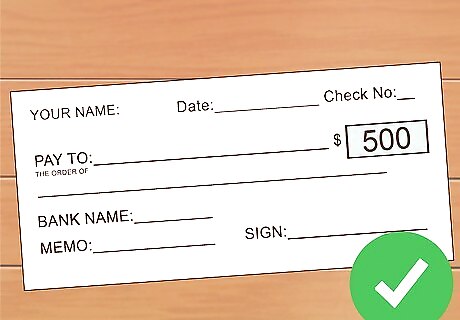
Become a donor. Money talks to us all, but it is the mother’s milk of politics. Representatives and senators spend at least three or four hours a day (and often more) fundraising. The quickest way to get a congressperson to start calling you instead of the other way around is to cut them a check. You might be surprised to find out how little you have to spend to get on a legislators’ radar. Individual contribution limits are only $2,700 per person per candidate, so a $300-$500 check is not an insubstantial contribution. In fact, it’s a contribution that’s virtually guaranteed to get you a call from your congressperson.



















Comments
0 comment